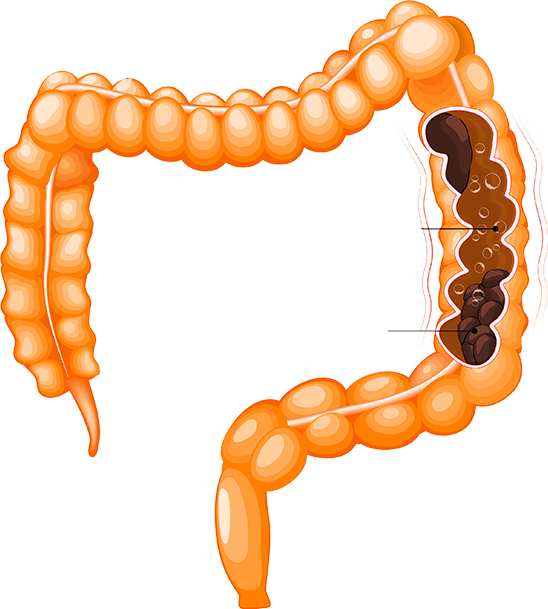How Constipation Tricks You
Though most people think of constipation as a harmless, temporary and easily treatable problem, research tells us that in reality, it is a much more dangerous, long-term and hard to treat condition:
Worse yet, clinical studies have now revealed that despite the wide availability of many over-thecounter constipation products on the market, the majority of sufferers do not see satisfactory results from their treatments.
There are three main reasons why constipation has the stubborn tendency to keep getting worse no matter how often you treat it:
The inner sensations we feel during constipation tend to be vague, preventing us from identifying its true cause
These sensations tend to also be misleading even when they seem clear and they misguide us into trying the wrong treatments
We tend to think of constipation as a single condition where in fact it is a term for many different conditions, each with its own proper treatment
Let’s look at all three of these issues more closely…
Constipation sensations tend to be so vague that they prevent us from identifying its true cause

Our digestive tract does not have the same rich sensory innervation as say, our skin. This is why sensations that emanate from our gut tend to be vague and hard to describe in clear terms.
Research shows that constipation sufferers usually express their symptoms in very generalized ways, such as:
- Having the sensation of a “full bottom” or a “full rectum”
- Simply not feeling the urge to go to the bathroom
- Sensing the urge to go to the bathroom but not being able to defecate
- Struggling with the inability to “open up” enough to pass stool
- Not feeling completely emptied out after a bowel movement
- Even having symptoms like headaches, fatigue, bloating and the loss of appetite
Now, compare this to the information doctors need to accurately identify the cause of your constipation, such as:
- How hard are your stools on a formal firmness scale?
- How long do your stools take to transit through the colon?
- Are your anorectal muscles and nerves functioning properly?
Questions like these are meant to identify different possible causes of your constipation but note how our sensations alone don’t really help provide the answers to these vital questions. At best, our sensations can only give us a fuzzy picture of what is happening inside us. Clinical evidence has now confirmed that there is indeed a disconnect between what the patient feels and what the doctor needs to diagnose the exact cause of your constipation. This means the doctor has to often rely on an educated guess to treat the problem (empirical treatment) and depend on trial and error to see what combination of treatments will work for the patient. This is part of the reason why treatment dissatisfaction is so high among constipation sufferers and why doctors need to manage patients longterm to see positive results.
Our sensations can mislead us into using the wrong constipation treatments
Research indicates that when it comes to constipation, not only is our perception vague, it is also likely to be misleading. Take for instance one of the most commonly diagnosed type of constipation called normal transit constipation. People with this type of constipation often complain of having hard stools and a lower defecation frequency but upon medical testing, the results contradict the patient’s assertions. This shows that the patient, guided by their sensations can actually be wrong about their own condition and can end up treating the wrong problem.
Studies confirm that constipation misperceptions are very common among sufferers and this can lead you into making poor treatment choices. The important thing to gather from this is that we can be easily tricked by our sensations, even when they seem clear and shouldn’t trust them too much when deciding on a treatment. The best way to avoid falling into this trap is to use a broad treatment that goes beyond just treating your noticeable symptoms and target all possible causes of your constipation.


Constipation is not a single condition but many different conditions with different treatments
We often use the term “constipation” as a broad catch-all to describe any kind of difficulty withhaving a bowel movement. In reality, there are many different kinds of constipation, each with its own particular cause and its own ideal treatment. However, since we normally treat all types of constipations alike, the treatments we choose often end up targeting the wrong causes. This has two
harmful effects – your constipation problem remains untreated and the underlying condition that caused your constipation continues to grow worse. This means not only will your constipation keep
returning, each bout will be more severe than the last and your gut will experience ongoing damage that never really gets to heal. It is for this reason that constipation has the tendency to become a chronic, ever-worsening problem with such high treatment failure rates.
So next, lets take a close look at all the different types of constipation and see what are the causes of each particular one. Knowing this can help you find faster relief from your symptoms and properly heal your gut but most important of all it will also give you lasting protection from the many serious long-term risks associated with both constipation and fecal impaction.



